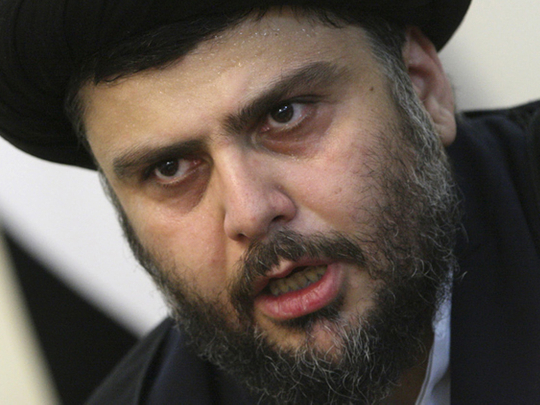
Could form post-election coalition with Al Maliki's group if neither wins enough seats to form government Image Credit: Supplied
The high-profile meeting in Damascus last week between former Iraqi prime minister Eyad Allawi and Moqtada Al Sadr, a one-time rival turned potential ally, brought back strong memories of various Lebanese politicians journeying to the Syrian capital during the Civil War to hammer out their differences.
Syria has stressed that it stands at arm's length from all political players in Iraq, having hosted Ammar Al Hakim of the Supreme Iraqi Islamic Council (SIIC) in June, also with the aim of speeding up the formation of an Iraqi government, with the country having been in limbo since parliamentary elections took place in March.
Syria's mediating role in Iraq — for years ignored by the Bush White House — is now beginning to resurface. In 2006, the famous Baker-Hamilton Report advised that stability in Iraq required engagement with both Syria and Iran. Talking to both simultaneously was too difficult a proposition for the Bush team to digest and continuing to talk to neither was not working.
The Americans reasoned that talking to Syria was the more viable option, since it had no history of anti-Americanism and shared similar views on the future of Iraq to regional heavyweights such as Saudi Arabia and Turkey. The Syrians were opposed to religious clerics running Baghdad and the de-Baathification laws that unjustly punished the entire Sunni community in 2003.
These views were shared by Saudi Arabia and Turkey, who expected the Iraqi government to disarm militias, be they Shiite or Sunni, and frowned upon the idea of granting Shiites autonomy in southern Iraq, similar to Iraqi Kurdistan in the north. That would have given the Kurds and Shiites control over Iraq's oil, leaving the Sunnis in central Iraq with no oil.
More influential
The Americans also realised that while Iran had at best influence over 80 to 90 per cent of Iraqi Shiites, Syria had more wide-ranging sway. It had the ear of important Shiite leaders such as Al Sadr, for example, as well as influence in Sunni districts where Iran had no control, thanks to overlapping tribes divided between Syria and Iraq, and its historic relationship with former Baathists.
US President Barack Obama is clearly more interested in achieving results in Iraq than in the Middle East peace process. In order for him to deliver on what matters most to the Syrians — the restoration of the occupied Golan Heights — he needs stability in Iraq. Syria and Saudi Arabia have hammered out their differences over Lebanon, realising that what united them in Baghdad was greater than what divided them in Beirut.
Simply put, both were furious with how Nouri Al Maliki had handled his country's relations with the Arab world and were keen to replace him with a moderate Iraqi leader such as Allawi. The Syrians and Saudis used their influence in January 2009 to encourage high Sunni turnout in the provincial elections.
Even in areas that were once hotbeds of the Sunni insurgency such as Tikrit, Sunnis voted in large numbers for Allawi's coalition. Then, in the March 2010 elections, thanks to the backing of Riyadh and Damascus, Allawi secured 91 seats, more than either Al Maliki's 89 or the SIIC's 70 (down by 70 seats since 2005).
Iraq's kingmaker
The only leader able to tip the balance in favour of either Allawi or Al Maliki is Al Sadr, who controls 40 seats in parliament. If he puts his weight behind Al Maliki's 89 MPs and the 30 MPs of the Iraqi National Alliance (INA), who are already his allies, the incumbent premier would have 159 votes in parliament — bringing him very close to the majority of 163 required. If Al Sadr threw his weight behind Allawi, the former prime minister would have 131 seats. With Sunni backing in parliament, he too could get closer to the 163-seat majority required.
Recently, it was rumoured in Baghdad that Iran had asked Al Maliki to give in to all of Al Sadr's demands in order to secure a sustainable alliance with the Sadrists, thereby preventing Allawi's rise to the premiership. This would require an amnesty releasing all of Al Sadr's men from prison, and giving the Sadrists important government posts that they held in 2006, such as the portfolios of education, health and commerce.
Al Maliki would have to protect Al Sadr from the US dragnet, while Al Sadr would legitimise Al Maliki within his vast constituency, including the young and poor in the suburbs of Baghdad. Al Maliki would remain prime minister, while Allawi would be given the less powerful position of president of the Political Council for National Security.
Twenty-four hours after this rumour came to light, Al Sadr showed up in Damascus for talks with Allawi. This put paid to the earlier scenario, as there followed an announcement that progress over Cabinet formation was being made with the former prime minister. On Saturday, media reports said that King Abdullah Bin Abdul Aziz of Saudi Arabia would be in Damascus early in August to discuss — among other things — the situation in Iraq.
Suddenly, thanks to regional dynamics, Al Maliki's chances of securing a new term as prime minister are looking very slim indeed.
Sami Moubayed is editor-in-chief of Forward Magazine in Syria.









